ATMEGA328P-20PU Atmel, ATMEGA328P-20PU Datasheet - Page 142

ATMEGA328P-20PU
Manufacturer Part Number
ATMEGA328P-20PU
Description
Manufacturer
Atmel
Datasheet
1.ATMEGA328P-20PU.pdf
(419 pages)
Specifications of ATMEGA328P-20PU
Cpu Family
ATmega
Device Core
AVR
Device Core Size
8b
Frequency (max)
20MHz
Interface Type
SPI/TWI/USART
Program Memory Type
Flash
Program Memory Size
32KB
Total Internal Ram Size
2KB
# I/os (max)
23
Number Of Timers - General Purpose
3
Operating Supply Voltage (typ)
3.3/5V
Operating Supply Voltage (max)
5.5V
Operating Supply Voltage (min)
2.7V
On-chip Adc
6-chx10-bit
Instruction Set Architecture
RISC
Operating Temp Range
-40C to 85C
Operating Temperature Classification
Industrial
Mounting
Through Hole
Pin Count
28
Package Type
PDIP
Lead Free Status / Rohs Status
Compliant
- Current page: 142 of 419
- Download datasheet (7Mb)
17.2.1
17.2.2
17.3
17.4
8025K–AVR–10/09
Timer/Counter Clock Sources
Counter Unit
Registers
Definitions
The Timer/Counter (TCNT2) and Output Compare Register (OCR2A and OCR2B) are 8-bit reg-
isters. Interrupt request (shorten as Int.Req.) signals are all visible in the Timer Interrupt Flag
Register (TIFR2). All interrupts are individually masked with the Timer Interrupt Mask Register
(TIMSK2). TIFR2 and TIMSK2 are not shown in the figure.
The Timer/Counter can be clocked internally, via the prescaler, or asynchronously clocked from
the TOSC1/2 pins, as detailed later in this section. The asynchronous operation is controlled by
the Asynchronous Status Register (ASSR). The Clock Select logic block controls which clock
source he Timer/Counter uses to increment (or decrement) its value. The Timer/Counter is inac-
tive when no clock source is selected. The output from the Clock Select logic is referred to as the
timer clock (clk
The double buffered Output Compare Register (OCR2A and OCR2B) are compared with the
Timer/Counter value at all times. The result of the compare can be used by the Waveform Gen-
erator to generate a PWM or variable frequency output on the Output Compare pins (OC2A and
OC2B).
Compare Flag (OCF2A or OCF2B) which can be used to generate an Output Compare interrupt
request.
Many register and bit references in this document are written in general form. A lower case “n”
replaces the Timer/Counter number, in this case 2. However, when using the register or bit
defines in a program, the precise form must be used, i.e., TCNT2 for accessing Timer/Counter2
counter value and so on.
The definitions in
Table 17-1.
The Timer/Counter can be clocked by an internal synchronous or an external asynchronous
clock source. The clock source clk
bit in the ASSR Register is written to logic one, the clock source is taken from the Timer/Counter
Oscillator connected to TOSC1 and TOSC2. For details on asynchronous operation, see
– Asynchronous Status Register” on page
”Timer/Counter Prescaler” on page
The main part of the 8-bit Timer/Counter is the programmable bi-directional counter unit.
17-2 on page 143
BOTTOM
MAX
TOP
See Section “17.5” on page 143.
Definitions
T2
The counter reaches the BOTTOM when it becomes zero (0x00).
The counter reaches its MAXimum when it becomes 0xFF (decimal 255).
The counter reaches the TOP when it becomes equal to the highest value in the
count sequence. The TOP value can be assigned to be the fixed value 0xFF
(MAX) or the value stored in the OCR2A Register. The assignment is depen-
dent on the mode of operation.
).
Table 17-1
shows a block diagram of the counter and its surrounding environment.
are also used extensively throughout the section.
T2
153.
is by default equal to the MCU clock, clk
for details. The compare match event will also set the
161. For details on clock sources and prescaler, see
ATmega48P/88P/168P
I/O
. When the AS2
”ASSR
Figure
142
Related parts for ATMEGA328P-20PU
Image
Part Number
Description
Manufacturer
Datasheet
Request
R

Part Number:
Description:
Manufacturer:
Atmel Corporation
Datasheet:

Part Number:
Description:
IC MCU AVR 32K FLASH 32QFN
Manufacturer:
Atmel
Datasheet:

Part Number:
Description:
IC MCU AVR 32K FLASH 32TQFP
Manufacturer:
Atmel
Datasheet:

Part Number:
Description:
IC MCU AVR 32K FLASH 28PDIP
Manufacturer:
Atmel
Datasheet:

Part Number:
Description:
8-bit Microcontrollers - MCU AVR 16KB FL 512B EE 1KB SRAM 20 MHZ GRN
Manufacturer:
Atmel

Part Number:
Description:
IC MCU AVR 32K FLASH 32TQFP
Manufacturer:
Atmel
Datasheet:

Part Number:
Description:
IC MCU AVR 32K FLASH 32QFN
Manufacturer:
Atmel
Datasheet:

Part Number:
Description:
Manufacturer:
Atmel Corporation
Datasheet:

Part Number:
Description:
Manufacturer:
ATMEL Corporation
Datasheet:

Part Number:
Description:
IC AVR MCU 32K 16MHZ 5V 44-QFN
Manufacturer:
Atmel
Datasheet:

Part Number:
Description:
IC AVR MCU 32K 16MHZ 5V 40DIP
Manufacturer:
Atmel
Datasheet:

Part Number:
Description:
IC AVR MCU 32K 16MHZ 5V 44TQFP
Manufacturer:
Atmel
Datasheet:

Part Number:
Description:
IC AVR MCU 32K 16MHZ IND 40-DIP
Manufacturer:
Atmel
Datasheet:

Part Number:
Description:
IC AVR MCU 32K 16MHZ IND 44-TQFP
Manufacturer:
Atmel
Datasheet:










